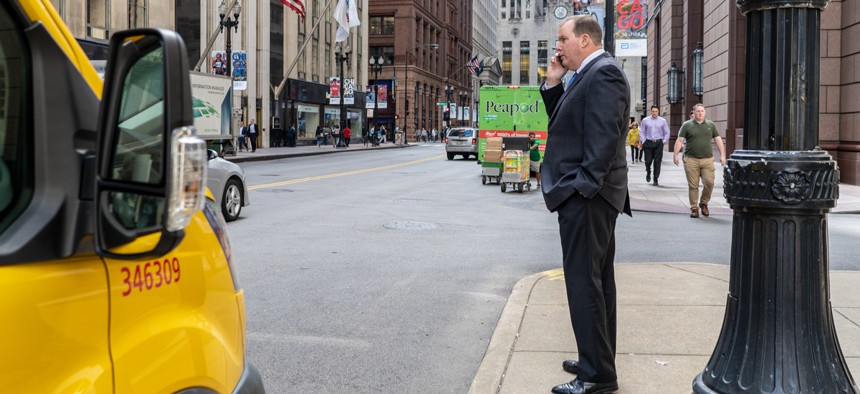State AGs Want FCC Action on ‘Neighbor Spoofing’

State attorneys general want the FCC to move on cracking down on "neighbor spoofing" robocalls. Shutterstock

Connecting state and local government leaders
These types of robocall scams “cannot be tolerated,” 35 state attorneys general wrote the Federal Communications Commission.
Everyone has gotten that annoying robocall that initially looks like it could be legitimate, maybe a doctor’s office or a kid’s school using a new number. On the caller ID, it’s the same area code and the same local exchange as your phone number.
But when you pick up, a recorded voice talks about health insurance or student loans.
It’s called “neighbor spoofing” and has been a trend for some time in robocalls, where the company or scammer on the other end makes it look like they are using a local number. This week, 35 state attorneys general called on the Federal Communications Commission to more aggressively crack down on the practice, saying in comments that the agency needs to adopt rules that allow providers to block all of these kind of calls.
“Consumers have recently reported receiving calls where their own phone numbers appeared on their caller ID,” the AGs wrote. “A consumer who answered one such call reported the caller attempted to trick her by saying he was with the phone company and required personal information to verify the account, claiming it had been hacked. Scams like this cannot be tolerated.”
State AGs have repeatedly noted that law enforcement action against these kind of calls can be difficult, as so many scammers are operating outside the country.
The AGs said they see a lot of promise in new protocols under development by the telecommunications industry that have been come to be known as STIR/SHAKEN and can help telephone service providers distinguish between legitimate calls and those that aren’t.
“We strongly recommend the FCC explore ways to encourage all domestic and international service providers to aggressively implement STIR/SHAKEN. The capability to identify illegally spoofed, scam calls will increase in proportion to the number of providers who adopt the STIR/SHAKEN protocols,” they wrote.
In a news release, Pennsylvania Attorney General Josh Shapiro noted that the new authentication process is expected to be ready to roll out next year.
The Pennsylvania AG’s office receives thousands of complaints every year about illegal calls, the release said, while noting that complaints to the Federal Trade Commission rose to 4.5 million in 2017. That year, the FCC issued a call-blocking order, which the AGs said needs to be strengthened.
In comments on behalf of providers, USTelecom Association told the FCC that they would like to see the agency expand the authority of companies to voluntarily block calls and institute “safe harbor” protections that reduce their liability if a legitimate call somehow gets wrongly flagged.
But the organization cautioned the federal agency against requiring companies to act. “Given that some voice providers may have limited capabilities to conduct the necessary heuristics to identify illegal robocalls, mandates in this area would be unwise,” the group said.
Consumer groups countered in their own comments that requiring compliance will be essential to making sure that STIR/SHAKEN can be effectively deployed and help stop calls. In Canada, regulators are giving all companies until March 2019 to comply, according to the filing by groups like Consumers Union and Consumer Federation of America.
“It’s important that the FCC take further action now, because robocalls are increasingly relentless,” the groups noted.
PREVIOUSLY on Route Fifty:
Laura Maggi is the Managing Editor at Government Executive's Route Fifty and is based in Washington, D.C.

NEXT STORY: Fast-tracking storm warnings





